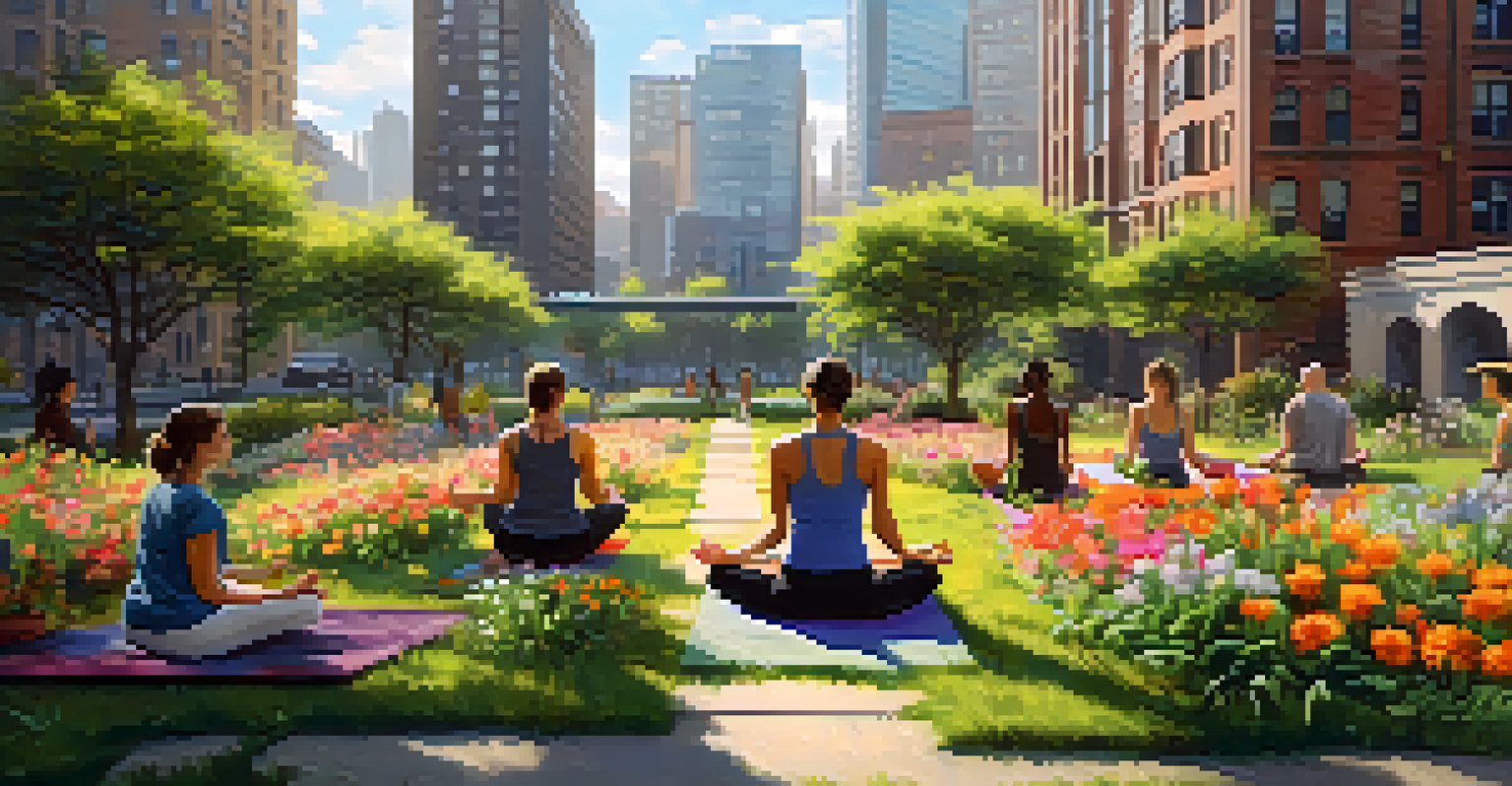The Energy of Place: How Locations Influence Spirituality

Understanding the Concept of Place and Spirituality
The idea of 'place' goes beyond just a physical location; it encompasses the emotional and spiritual energy we associate with different environments. For many, spiritual experiences are deeply intertwined with specific places, whether it's a serene forest, a bustling city, or a sacred temple. Understanding this connection can help us appreciate how our surroundings shape our spiritual journeys.
The clearest way into the Universe is through a forest wilderness.
When we think about the energy of a place, it's often linked to the memories and emotions it evokes. For instance, a childhood home might bring feelings of safety and nostalgia, while a vibrant cityscape could inspire creativity and excitement. These emotional responses can significantly influence our spiritual practices and beliefs, acting as a backdrop for personal growth.
Moreover, different cultures have long recognized the importance of place in spirituality. From the ancient Greeks attributing divine qualities to mountains and rivers to modern practices like earth-based spirituality, locations have served as sacred spaces that enhance our connection to the divine and ourselves.
Nature's Role in Spiritual Experience
Nature has a unique ability to foster spiritual experiences, often making us feel more connected to the universe. The tranquility of a quiet forest, the majesty of a mountain range, or the vastness of the ocean can evoke profound feelings of peace and awe. Many people report experiencing moments of clarity or enlightenment in natural settings, highlighting the spiritual energy that exists in these places.

Think about a time you've stood at the edge of a breathtaking vista, perhaps watching a sunset paint the sky in brilliant hues. In those moments, it’s common to feel a deep sense of belonging and interconnectedness with nature. This experience can lead to reflections that challenge our everyday perceptions and encourage spiritual growth.
Place Shapes Spiritual Journeys
The emotional and spiritual energy associated with different environments significantly influences our personal growth and spiritual practices.
Incorporating nature into our spiritual practices, whether through meditation in a park or hiking in the woods, can enhance our connection to the earth and ourselves. By recognizing nature as a source of energy, we can create rituals that deepen our spiritual experiences and foster personal transformation.
Sacred Sites and Their Spiritual Significance
Throughout history, certain locations have been designated as sacred due to their spiritual significance. Places like Stonehenge, the Great Wall of China, and Machu Picchu are not only remarkable for their historical value but also for the energy they radiate. Visiting these sites often elicits feelings of reverence and connection to something greater than ourselves.
To be whole. To be complete. This is the greatest gift of life.
These sacred sites often serve as pilgrimage destinations, with individuals traveling great distances to experience the energy of the place firsthand. The journey to these locations can be as transformative as the visit itself, encouraging self-reflection and spiritual awakening. For many, the act of pilgrimage is a way to connect with their beliefs on a deeper level.
Moreover, the rituals and practices that take place at these locations often enhance their energy. Community gatherings, ceremonies, and meditative practices contribute to the spiritual atmosphere, allowing individuals to tap into a collective consciousness that can amplify personal spiritual experiences.
Urban Spaces and Their Spiritual Dynamics
While nature and sacred sites often dominate discussions on spirituality, urban spaces also have a unique energy that can influence our spiritual journeys. Cities are bustling with life, diversity, and a sense of possibility, which can inspire creativity and introspection. The energy of a city can be both overwhelming and exhilarating, prompting individuals to explore their spirituality in new ways.
Consider how the architectural beauty of a cathedral or the calming presence of a community garden can evoke spiritual feelings in the heart of a city. These urban sanctuaries provide spaces for reflection and connection, reminding us that spirituality can thrive even amidst the chaos of urban life. It's about finding pockets of peace and inspiration in unexpected places.
Nature Enhances Spiritual Connection
Natural settings evoke feelings of peace and interconnectedness, fostering spiritual experiences that promote reflection and personal transformation.
Additionally, urban environments often bring together people from diverse backgrounds, creating opportunities for spiritual dialogue and growth. Engaging with different cultures and beliefs can broaden our understanding of spirituality, challenging us to rethink our own practices and beliefs in the context of a larger community.
The Influence of Architecture on Spirituality
Architecture plays a significant role in shaping our spiritual experiences, often reflecting the beliefs and values of a culture. The design of sacred spaces, such as cathedrals, mosques, or temples, is often carefully thought out to enhance spiritual energy. Tall ceilings, large windows, and intricate details can evoke feelings of awe and reverence, inviting individuals to connect with the divine.
For example, the use of light in architectural design can create a spiritual ambience. When sunlight filters through stained glass windows, it casts colorful patterns that can inspire introspection and meditation. This interaction between light and space highlights how thoughtful architectural design can enhance our spiritual experiences.
Moreover, the layout of a space can influence how individuals engage with their spirituality. Open areas may encourage communal gatherings, while secluded corners invite personal reflection. Understanding the impact of architecture on spirituality can help us appreciate the environments we choose to engage with on our spiritual journeys.
Cultural Practices and Their Connection to Place
Different cultures have unique spiritual practices that are often closely tied to specific locations. For instance, Indigenous peoples may hold rituals that honor the land, emphasizing the interconnectedness of nature and spirituality. These practices not only highlight the significance of place but also serve as a reminder of our responsibility to care for the earth.
The energy of a place can also influence cultural celebrations and rituals, shaping how communities express their spirituality. Festivals, ceremonies, and gatherings often take place in locations that enhance their significance, such as sacred mountains or community centers. These events create a shared space for individuals to connect with each other and their beliefs.
Urban Spaces Offer Unique Energy
Cities provide diverse environments that inspire creativity and introspection, allowing spirituality to thrive even amidst urban chaos.
By exploring cultural practices related to place, we can gain insight into how spirituality is expressed in different contexts. This understanding can deepen our appreciation for the diverse ways people experience and connect with the energy of their surroundings, fostering a more inclusive approach to spirituality.
Personal Reflections: Finding Your Spiritual Place
As we consider the relationship between place and spirituality, it's essential to reflect on our own experiences. What locations have resonated with you on a spiritual level? Whether it's a serene beach, a bustling café, or a sacred site, identifying these places can help you understand how they shape your spiritual journey.
Engaging with these locations intentionally can enhance your spiritual practices. For example, if a particular park brings you peace, consider establishing a routine of meditation or contemplation there. By creating a ritual around a place that holds spiritual significance for you, you can deepen your connection to that energy.

Ultimately, the energy of place is personal and subjective. Each individual's journey is unique, and the places that resonate with us can serve as powerful catalysts for spiritual growth. By paying attention to these connections, we can cultivate a more profound understanding of our spirituality and the world around us.